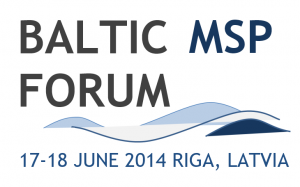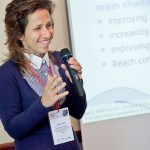 Workshop: How to enhance pan-Baltic cooperation and consultation on MSP
Workshop: How to enhance pan-Baltic cooperation and consultation on MSP
Moderator: Kira Gee, University of Liverpool
Presentations
- Angela Schultz-Zehden, s.Pro – sustainable projects GmbH:PartiSEApate: Multi-Level-Governance in Maritime Spatial Planning. Findings, Recommendations – download
- Olga Sedioli, Soil and Coast Protection and Land Reclamation Service, Emilia-Romagna Region, Italy: Transboundary cooperation and consultation in MSP: the Adriatic experience – download
- Kai Trümpler, German Federal Maritime and Hydrographic Agency:Multitude of uses on the sea. Potential conflicts between uses and/or uses and marine environment - download
Workshop summary
The aim of the workshop was to discuss the PartiSEApate model for transboundary MSP governance and compare it to experiences from other European regions. Key questions included:
- What are the “hot topics” in transboundary MSP in other European regions?
- What experiences exist elsewhere with respect to transboundary MSP governance?
- Can MSP governance models be transferred between regions?
 The workshop began with a presentation of the PartiSEApate governance model (Angela Schultz-Zehden, s.Pro, Germany), followed by a presentation of the Adriatic perspective on transboundary cooperation and consultation (Olga Sedioli, Emilia Romagna Region, Italy), a brief summary of North Sea experiences (Kai Trümpler, BSH, Germany), and a general discussion. The following lessons can be drawn.
The workshop began with a presentation of the PartiSEApate governance model (Angela Schultz-Zehden, s.Pro, Germany), followed by a presentation of the Adriatic perspective on transboundary cooperation and consultation (Olga Sedioli, Emilia Romagna Region, Italy), a brief summary of North Sea experiences (Kai Trümpler, BSH, Germany), and a general discussion. The following lessons can be drawn.
Differentiate between transboundary MSP processes. Re-emphasis was made of the difference between cross-border processes (involving two neighbouring countries), pan-Baltic processes (involving more than two countries), consultation (a formal process occurring between countries) and cooperation (an informal process). All play a role in multilevel MSP governance, but each requires a different approach.
Transboundary MSP is context-dependent. The Baltic Sea, North Sea, Adriatic and European Atlantic all have different starting points with respect to transboundary MSP. There are different histories of cooperation, differences in existing governance structures (e.g. the availability of high level decision making groups, such as the HELCOM-VASAB MSP Working Group) and differences in the shared policy context (e.g. EU membership). Geography is also an issue, as countries face each other around the regional seas but are aligned next to each other in the case of the European Atlantic, making direct cooperation between all riparian countries more difficult.
 Transboundary MSP needs time to grow. The most significant difference, however, is the regions’ past experience with MSP projects. The Baltic and Adriatic have a long history of successful transnational MSP projects which has prepared the ground for “real life” transboundary MSP. Over the last 10 years, common themes in MSP have been identified, there is awareness of the need to think beyond national boundaries, and most importantly, trust has been generated between MSP practitioners, relevant authorities and stakeholders. Key success factors include a core of MSP “champions” from the various countries, openness to different stakeholders and relevant authorities, the development of a common language, and better understanding of each other’s contexts and approaches to MSP. This core of trust and mutual understanding is a key element of a successful transboundary MSP process at sea basin scale. The lesson is that transboundary MSP, like any other MSP process, needs time to grow and cannot be forced in the short term.
Transboundary MSP needs time to grow. The most significant difference, however, is the regions’ past experience with MSP projects. The Baltic and Adriatic have a long history of successful transnational MSP projects which has prepared the ground for “real life” transboundary MSP. Over the last 10 years, common themes in MSP have been identified, there is awareness of the need to think beyond national boundaries, and most importantly, trust has been generated between MSP practitioners, relevant authorities and stakeholders. Key success factors include a core of MSP “champions” from the various countries, openness to different stakeholders and relevant authorities, the development of a common language, and better understanding of each other’s contexts and approaches to MSP. This core of trust and mutual understanding is a key element of a successful transboundary MSP process at sea basin scale. The lesson is that transboundary MSP, like any other MSP process, needs time to grow and cannot be forced in the short term.
Video recording
Part 1
Part 2
Part 3

